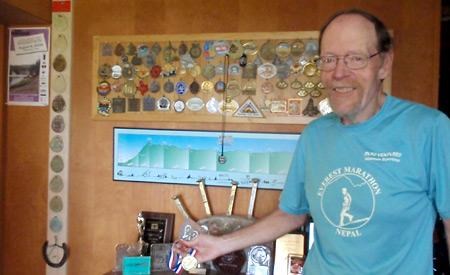For Rob McWilliam, 63, running is a way of life. Whether it’s running the highest levels of government bureaucracy or a marathon on Mount Everest, this Texada Islander has done it.
McWilliam retired to Texada after a federal and territorial civil service career which took him to the level of deputy minister, the top staff position in a government ministry. He was also the president and CEO of Yukon Energy Corporation and set up environmental protection programs in Jamaica for Canadian International Development Agency.
For recreation, he runs and he has entered and completed 135 marathons and ultra-marathons (longer than 42 kilometres) on six continents. “Some perhaps I shouldn’t have,” he reflects after suffering from bronchitis and elevation sickness during the Mount Everest run last December. McWilliam is booked to run on the remaining continent, Antarctica, in 2014 for the marathon race that is held there every March. He says there’s a long waiting list for that event due to the limited number of participants allowed.
After last year’s kickoff, McWilliam is continuing as race director for Texada’s second annual Run the Rock marathon and half-marathon on Sunday, August 26. About 80 participants are expected, up from 73 in 2011. “We’ll build in small increments each year as people in the running community come to recognize this as a key event on the summer calendar. It builds community locally and bolsters the island’s economy by bringing new people to Texada.”
McWilliam says he was not athletic as a child in Saskatchewan, where political arguments were the local sport. “Debates between family members with opposite viewpoints was what inspired me to work in a political arena.” After earning a masters degree in political science from McMaster University (he later earned a second masters in regional planning from University of British Columbia), he was hired by the federal government and worked for the Department of Public Works in the Yukon. He was later hired by the Northwest Territories government as a settlement manager on Broughton Island (now known as Qikiqtarjuaq in the territory of Nunavut). There he met his wife, community health nurse Elizabeth Barclay, from Vancouver, and whose parents, Harry and Florence Barclay, had a summer home in Gillies Bay.
McWilliam loved the Yukon and when he had the opportunity to return, he did, working for the territorial cabinet. “I was so impressed with its majestic scenery, pristine environment and the culture of the people. They were doing whatever it took to survive.”
He later became a local government advisor for the Yukon government. “There was very embryonic organization in the smaller communities at the time, which I helped become effective municipal governments. Also the territory was evolving into a provincial style of governance, so it was an exciting era to be there.” McWilliam was promoted to assistant deputy minister for economic development, planning and mining. He was a negotiator for first nations’ land claims for the Yukon government and was deputy minister in three departments: government services, which included public works, supply services, transportation and infrastructure, renewable resources and lastly health and social services.
“I’m grateful for the opportunities and challenges I couldn’t have had elsewhere. There was a frontier mentality at the time and people were prepared to take risks.” At every stage of his career, McWilliam viewed himself as a professional who “gave the best advice possible to the government of the day to carry out the tasks at hand.”
With miles of pristine trails in the Yukon, he began serious cross-country skiing and he ran to get in shape for the ski season. “The first time I ran a full mile, I felt it was an incredible achievement.” Starting with shorter races, it was in Whitehorse where he ran his first marathon. He co-founded and was race director of the Yukon River Trail Marathon, now in its 12th year, and rated among Canada’s top-10 trail events. He’ll be there again for the race in early August. He ran most legs of the 110-mile Skagway to Whitehorse Relay during his 28 years in the north.
While living in the Yukon, every summer the family would travel south to spend time with Barclay’s parents in Gillies Bay and McWilliam knew that was where they would retire. Now, he can often be seen running on the island. “People have their own reasons for running or not running and for me it was a fantastic stress reliever. It makes me feel better mentally and physically and running is an important part of my life. Being active is known to reduce the risk of Alzheimer’s. Besides, I get snarly if I don’t get my endorphin fix.”



